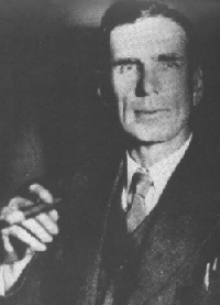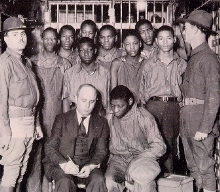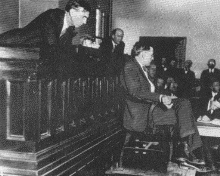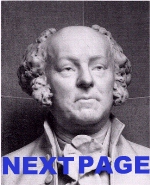| I see a hero in a courtroom in
the small northern Alabama town of Athens. It’s 10:00 on June 22,
1933. Every seat is taken in the Limestone County Courthouse.
The crowd is waiting to hear Judge James Horton call for arguments on a
defense motion for a new trial in the Scottsboro Boys case.
The Scottsboro Boys case: Two white women, Victoria Price and Ruby Bates, accused eight black teenagers of gang-raping them on a Southern Railroad freight train as it passed near Scottsboro. The boys narrowly escaped lynching only to have juries sentence them to death—based almost entirely on the testimony of the women. The United States Supreme Court set aside the convictions. The Court found that the Scottsboro Boys attorneys—a real estate attorney from Tennessee who showed up in court drunk and a forgetful local attorney who hadn’t tried a case in decades—failed to provide constitutionally sufficient representation. Then two months ago, in the first of an expected series of retrials, an Alabama jury of twelve white men came into Judge Horton’s courtroom and announced that they had found Scottsboro Boy Haywood Patterson guilty. He should die, the jury said, in the electric chair. The jury reached its conclusion even though Ruby Bates, one of the two original complainants had recanted her earlier testimony and now said there had been no rape—and despite evidence that within a few hours of the alleged rape no motile semen could be detected in either woman. Although judges have the power to set aside jury verdicts, no one—no one—expects this to happen, not in the most notorious criminal case in Alabama history. Most Alabamians resented what they saw as the attempts by the Scottsboro defense team—northern Jews paid for by the Communist Party, no less—to attack their jury system, their social structure, and their way of life. The local prosecutor had shouted to the jury in his summation, “Show them that Alabama justice cannot be bought and sold with Jew money from New York!” The trial had become in many ways a referendum on Alabama justice, and no judge who expected to be re-elected would ever upset the jury’s determination. It would be political suicide. In fact, an emissary from Montgomery had even stopped by Judge Horton’s office three weeks before to drive home the point. The visitor told the judge that if he were to annul the jury's verdict, his career as a judge was over. Without any opening remarks, Judge Horton looks down at a typewritten sheet of paper and begins reading in a low, steady voice: Social order is based on law, and its perpetuity on its fair and impartial administration. Deliberate injustice is more fatal to the one who imposes it than to the one on whom it is imposed....The Court will decide this motion upon the sole consideration of what is its duty under the law…. The vital ground of this motion, as the Court sees it, is whether or not the verdict of the jury is contrary to the evidence. Is there sufficient credible upon which to base a verdict? For the next hour, James Horton discusses the evidence in the case of Alabama v Patterson. Then he concludes: It is therefore ordered and adjudged by the Court that the motion be granted; that the verdict of the jury in this case and the judgment of the Court sentencing this defendant to death be set aside and that a new trial is hereby ordered.
|
READ
MORE ABOUT THE SCOTTSBORO BOYS TRIAL
WITHOUT
FEAR OR FAVOR: JUDGE JAMES EDWIN HORTON AND THE SCOTTSBORO BOYS TRIAL
|
Many Alabama papers refused to
print Judge Horton’s decision. Many in the state attacked him.
The defendant whose death sentence Horton set aside, Haywood Patterson,
said, "His decision made me feel good. I saw that there could be
white folks in the South with the right mind.”
Despite the knowledge that setting aside the Patterson verdict would likely mean an end to his judicial career, Horton said later that the decision was not difficult. A judge must do his duty. "My mother early taught me a phrase she said was her father's motto," Horton recalled. "It has frequently come to mind in difficult situations." The phrase Horton learned on his mother's knee was "Justitia fiat coelum ruat"—“Let justice be done though the Heavens may fall.” Judge Horton ran for re-election the following year. Opposition to Horton was most intense in Morgan County, where the Scottsboro Boys trial had taken place. A newspaper delivery boy in Decatur said that he could walk his entire delivery route without finding a single person supporting Horton. Horton's wife, Anna, recalled taking shopping trips to Decatur with the judge. "The looks were terrible over there," she said. Horton, however, remained popular among the people who knew him best. Three hundred Athens women gathered to show their support for Horton. The ministers of Athens issued a statement praising Horton's "recognized honesty" and his willingness to align himself "with the forces of right and good morals." Two-hundred-sixty Athens businessmen endorsed their judge and vouched for "his upright personal character.” Birmingham columnist John Temple Graves tried to explain the surprising local support for Horton despite his unpopular decision: "Horton is their own good man, no matter how foreign the occasional company his conscience make him keep. They feel it because he himself feels it. He has little or no thought for the liberal and other groups which acclaim him from a distance. He does the right thing as he sees it, with no particular sense of the scene about him, but with an enormous sense of right-doing ancestors gone and example-bound descendants to come. His 'social conscience' is vertical rather than horizontal." Horton, who had previously either won unopposed or by large margins, lost his race for re-election in 1934. Horton began to devote fulltime to farming. He raised cotton, corn, and soybeans. His herd of award-winning Aberdeen-Angus cattle was the largest in Alabama. Horton grew old. He spent afternoons playing Rook, Hearts, and dominoes with other farmers at a cotton gin near his home. Once every so often, researchers or area school children would visit Horton’s farmstead to ask about his recollections of the Scottsboro Boys trial. Shortly after Horton's death in 1973, county officials installed a plaque on the south wall of the second-floor Limestone County courtroom in which he read his opinion setting aside the jury's verdict in the Patterson trial. I visited this courtroom two years ago and saw the plaque. In raised bronze are inscribed words from the judge's instructions to the jury in the Scottsboro case: So far as the law is concerned it knows neither native nor alien, Jew nor Gentile, black nor white. This case is no different from any other. We have only to do our duty without fear or favor. |



